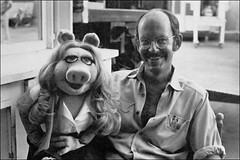After three days of serious Left Brain posts on social networks and identity, I thought we could all use a little break. So I went to the archives and found a few of my favorite lighthearted posts on identity.
Duckrabbit
One interesting metaphor for human and avatar identity is Wittgenstein's duckrabbit. This picture can be perceived as either a duck or a rabbit. (If you can’t see them right away, the duck is facing to the left and the rabbit to the right.) But you can't see them simultaneously. You can bounce back and forth really fast, but not see both images at the same time.
I think that metaphor is close to the reality of human and avatar identity. At least in cases where there is a great divergence between the two. There is no morph of human and avatar. It's the anti-Gestalt: The whole is less than the sum of its parts.
Dear Miss Piggy,
I was shocked and disappointed to learn today that you are not really a woman, but a man named Frank Oz. People have feelings! Poor Kermit must be heartbroken.
 Can you imagine how sickened people were to find that the adorable little coquette they've had crushes on for all these years has a penis. Don't you have any shame? Now I have to wonder about all of you Muppets. Next thing you know, Cookie Monster is going to come out as a cross-dressing dyke. It just makes my skin crawl.
Can you imagine how sickened people were to find that the adorable little coquette they've had crushes on for all these years has a penis. Don't you have any shame? Now I have to wonder about all of you Muppets. Next thing you know, Cookie Monster is going to come out as a cross-dressing dyke. It just makes my skin crawl.
Just because newfangled television technology can let you pretend to be something you're not, it doesn't mean you have to start "experimenting" with us as the guinea pigs. Take my advice MR. PIGGY and be content with who you REALLY are.
Sincerely,
Anonymous
I think that metaphor is close to the reality of human and avatar identity. At least in cases where there is a great divergence between the two. There is no morph of human and avatar. It's the anti-Gestalt: The whole is less than the sum of its parts.
Dear Miss Piggy
Dear Miss Piggy,
I was shocked and disappointed to learn today that you are not really a woman, but a man named Frank Oz. People have feelings! Poor Kermit must be heartbroken.
 Can you imagine how sickened people were to find that the adorable little coquette they've had crushes on for all these years has a penis. Don't you have any shame? Now I have to wonder about all of you Muppets. Next thing you know, Cookie Monster is going to come out as a cross-dressing dyke. It just makes my skin crawl.
Can you imagine how sickened people were to find that the adorable little coquette they've had crushes on for all these years has a penis. Don't you have any shame? Now I have to wonder about all of you Muppets. Next thing you know, Cookie Monster is going to come out as a cross-dressing dyke. It just makes my skin crawl.Just because newfangled television technology can let you pretend to be something you're not, it doesn't mean you have to start "experimenting" with us as the guinea pigs. Take my advice MR. PIGGY and be content with who you REALLY are.
Sincerely,
Anonymous
Mask Speaks


2 comments:
Your Frank Oz remark is relevant to a point I was going to raise in your Nymwars series.
This point is that storytelling is evident in all cultures throughout all history. For tens of thousands of years humans have lived with other humans and also with imaginary people be they historical figures or purely fantasy.
Something that might be worth investigating is why our attitudes toward imaginary characters online is different to those in any other medium. Your Oz comment provides one example. It is accepted that a character's gender need not be the same as that of its creator. Miss Piggy is female, Frank Oz is male. But I have seen many people call Prokofy 'she' even though Prok's avvie is male.
Another example. We accept that characters in a story are seperate persons with limited knowledge of each other's mind. For instance, we know that Goldilocks is unaware the bears are returning home, and that the bears do not know a little girl sleeps in one of their beds. But, if the bears and Goldilocks were alts of the same person in SL, most people would say it is absurd that the bears do not know precisely what Goldilocks knows and vice versa.
Thinking of the Goldilocks analogy, I agree that people would think that way, but it is a bit absurd since the writer of Goldilocks most likely knew what was in each character's mind at the time...
The whole controversy about the fear of pseudonyms is, for me, profoundly confusing. We have spent decades trusting people that we don't know on television, on the radio (where so few of the personalities use their RL names) and other places.
Post a Comment